Effects of Science and Technology on Work and the UK Society
VerifiedAdded on 2021/06/17
|35
|3847
|20
Report
AI Summary
This report investigates the complex relationship between technology and jobs in the UK, examining public perception and its influence on job creation. The study utilizes data from the World Values Survey Wave 5 of 2015, focusing on variables such as the importance of work, opinions on science and technology, and their impact on health, ease of life, and job opportunities. Employing descriptive statistics, frequencies, proximities, sequence plots, correlations, and t-tests, the analysis aims to test the hypotheses regarding the positive or negative effects of technology on the UK job market and societal well-being. The findings provide insights into the general opinions on the role played by science and technology in the given sample space, considering the role of employment, welfare of the society and also how technology affects individual lives. The results will be used to accept or nullify the original hypotheses.
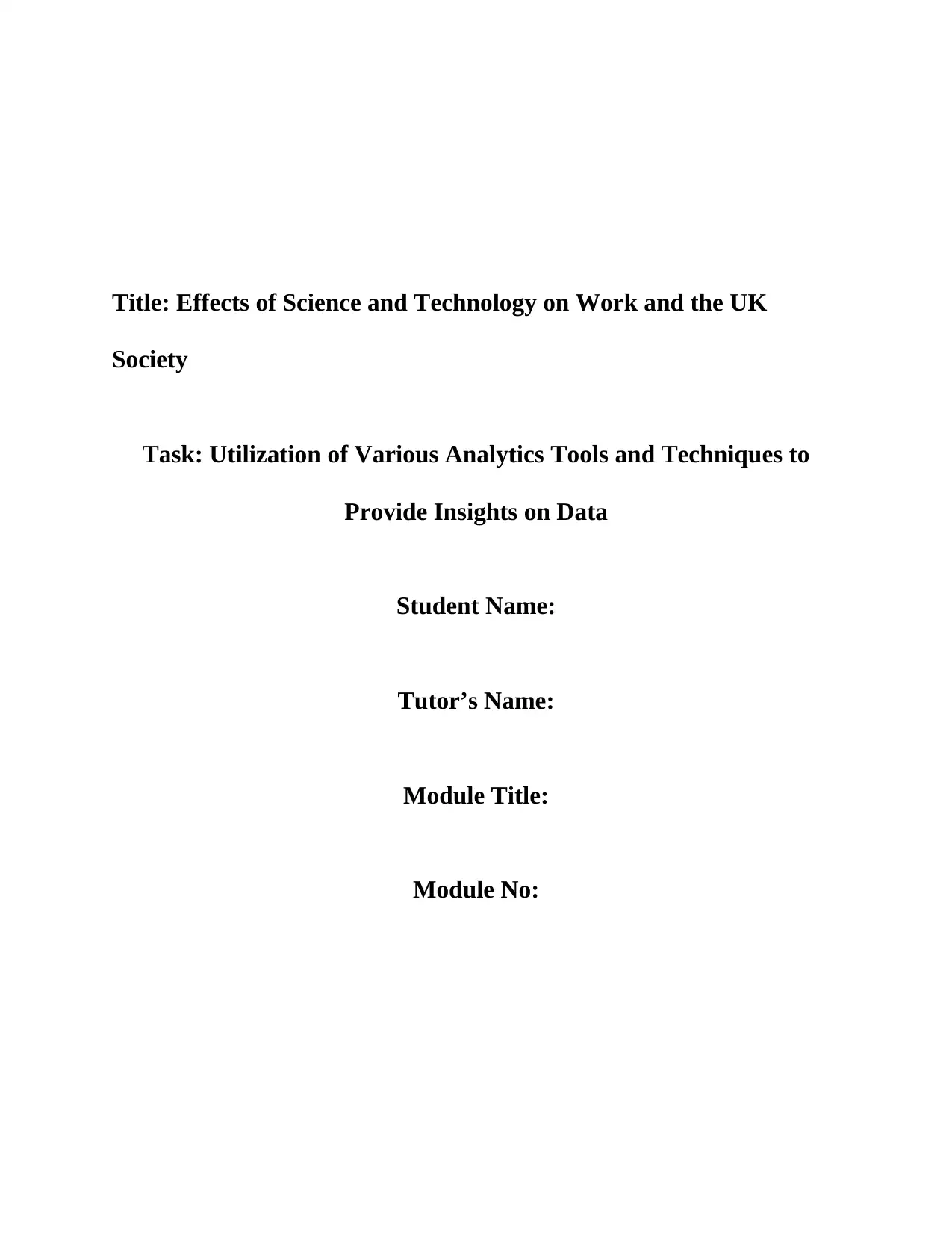
Title: Effects of Science and Technology on Work and the UK
Society
Task: Utilization of Various Analytics Tools and Techniques to
Provide Insights on Data
Student Name:
Tutor’s Name:
Module Title:
Module No:
Society
Task: Utilization of Various Analytics Tools and Techniques to
Provide Insights on Data
Student Name:
Tutor’s Name:
Module Title:
Module No:
Paraphrase This Document
Need a fresh take? Get an instant paraphrase of this document with our AI Paraphraser
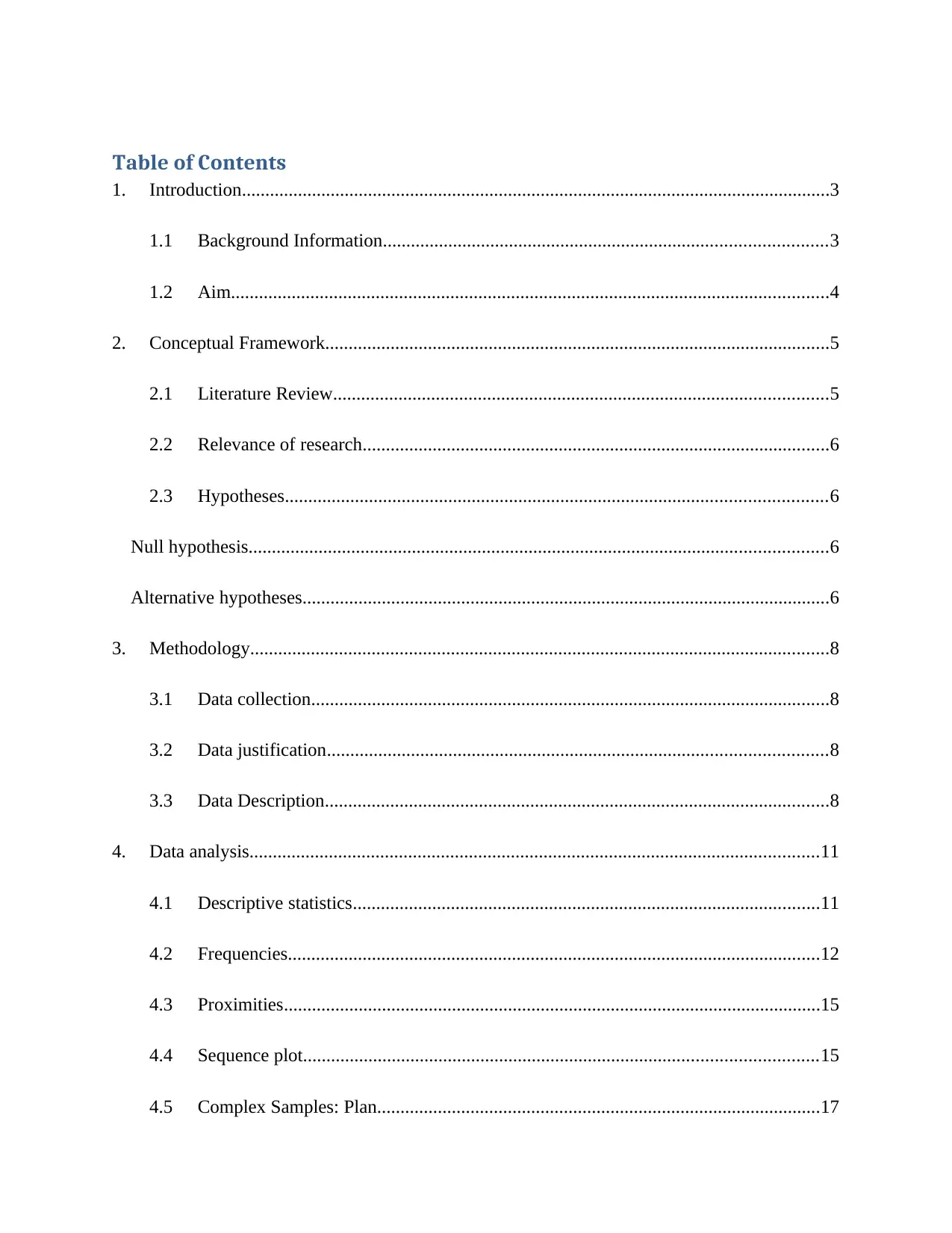
Table of Contents
1. Introduction..............................................................................................................................3
1.1 Background Information...............................................................................................3
1.2 Aim................................................................................................................................4
2. Conceptual Framework............................................................................................................5
2.1 Literature Review..........................................................................................................5
2.2 Relevance of research....................................................................................................6
2.3 Hypotheses....................................................................................................................6
Null hypothesis............................................................................................................................6
Alternative hypotheses.................................................................................................................6
3. Methodology............................................................................................................................8
3.1 Data collection...............................................................................................................8
3.2 Data justification...........................................................................................................8
3.3 Data Description............................................................................................................8
4. Data analysis..........................................................................................................................11
4.1 Descriptive statistics....................................................................................................11
4.2 Frequencies..................................................................................................................12
4.3 Proximities...................................................................................................................15
4.4 Sequence plot..............................................................................................................15
4.5 Complex Samples: Plan...............................................................................................17
1. Introduction..............................................................................................................................3
1.1 Background Information...............................................................................................3
1.2 Aim................................................................................................................................4
2. Conceptual Framework............................................................................................................5
2.1 Literature Review..........................................................................................................5
2.2 Relevance of research....................................................................................................6
2.3 Hypotheses....................................................................................................................6
Null hypothesis............................................................................................................................6
Alternative hypotheses.................................................................................................................6
3. Methodology............................................................................................................................8
3.1 Data collection...............................................................................................................8
3.2 Data justification...........................................................................................................8
3.3 Data Description............................................................................................................8
4. Data analysis..........................................................................................................................11
4.1 Descriptive statistics....................................................................................................11
4.2 Frequencies..................................................................................................................12
4.3 Proximities...................................................................................................................15
4.4 Sequence plot..............................................................................................................15
4.5 Complex Samples: Plan...............................................................................................17
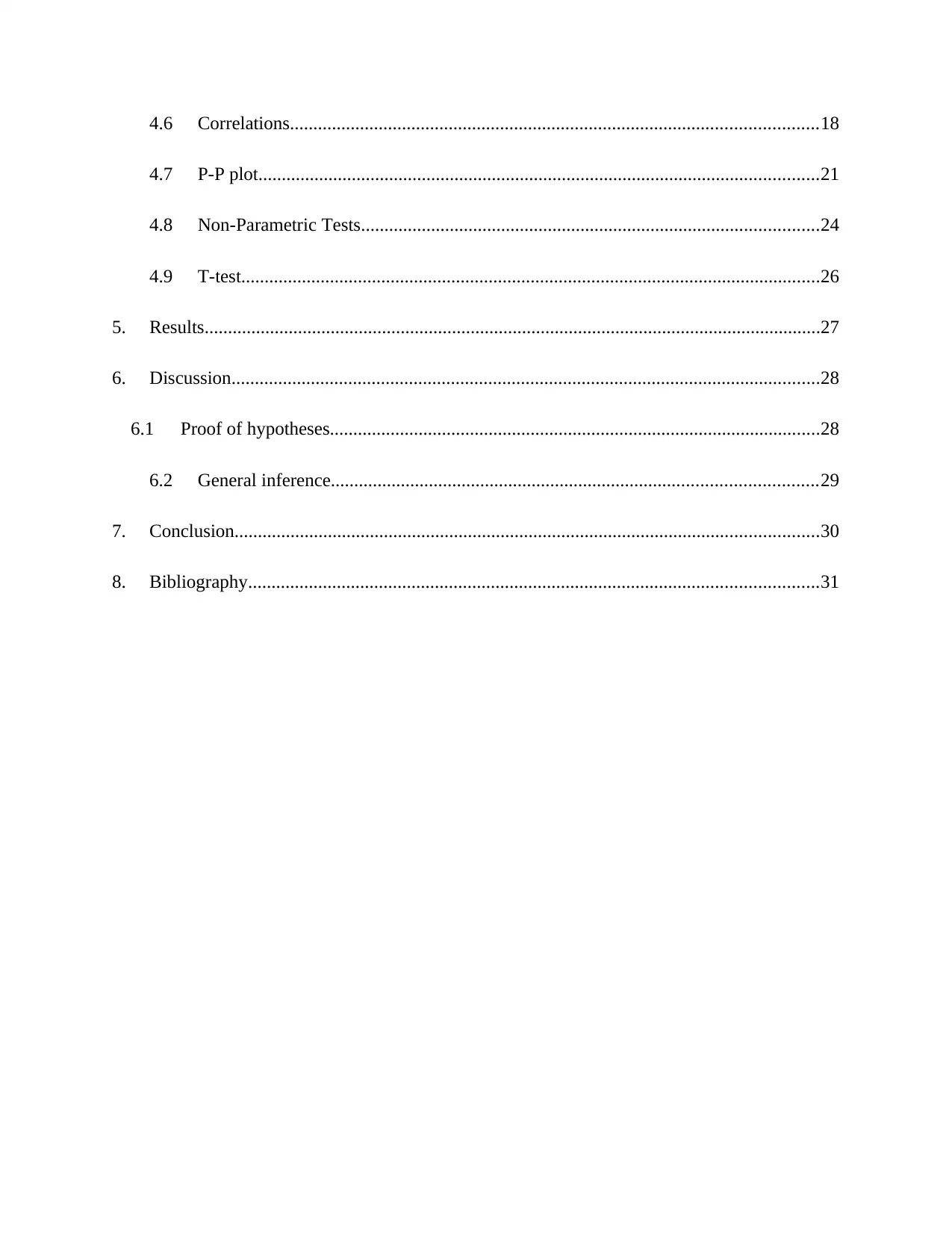
4.6 Correlations.................................................................................................................18
4.7 P-P plot........................................................................................................................21
4.8 Non-Parametric Tests..................................................................................................24
4.9 T-test............................................................................................................................26
5. Results....................................................................................................................................27
6. Discussion..............................................................................................................................28
6.1 Proof of hypotheses.........................................................................................................28
6.2 General inference........................................................................................................29
7. Conclusion.............................................................................................................................30
8. Bibliography..........................................................................................................................31
4.7 P-P plot........................................................................................................................21
4.8 Non-Parametric Tests..................................................................................................24
4.9 T-test............................................................................................................................26
5. Results....................................................................................................................................27
6. Discussion..............................................................................................................................28
6.1 Proof of hypotheses.........................................................................................................28
6.2 General inference........................................................................................................29
7. Conclusion.............................................................................................................................30
8. Bibliography..........................................................................................................................31
⊘ This is a preview!⊘
Do you want full access?
Subscribe today to unlock all pages.

Trusted by 1+ million students worldwide
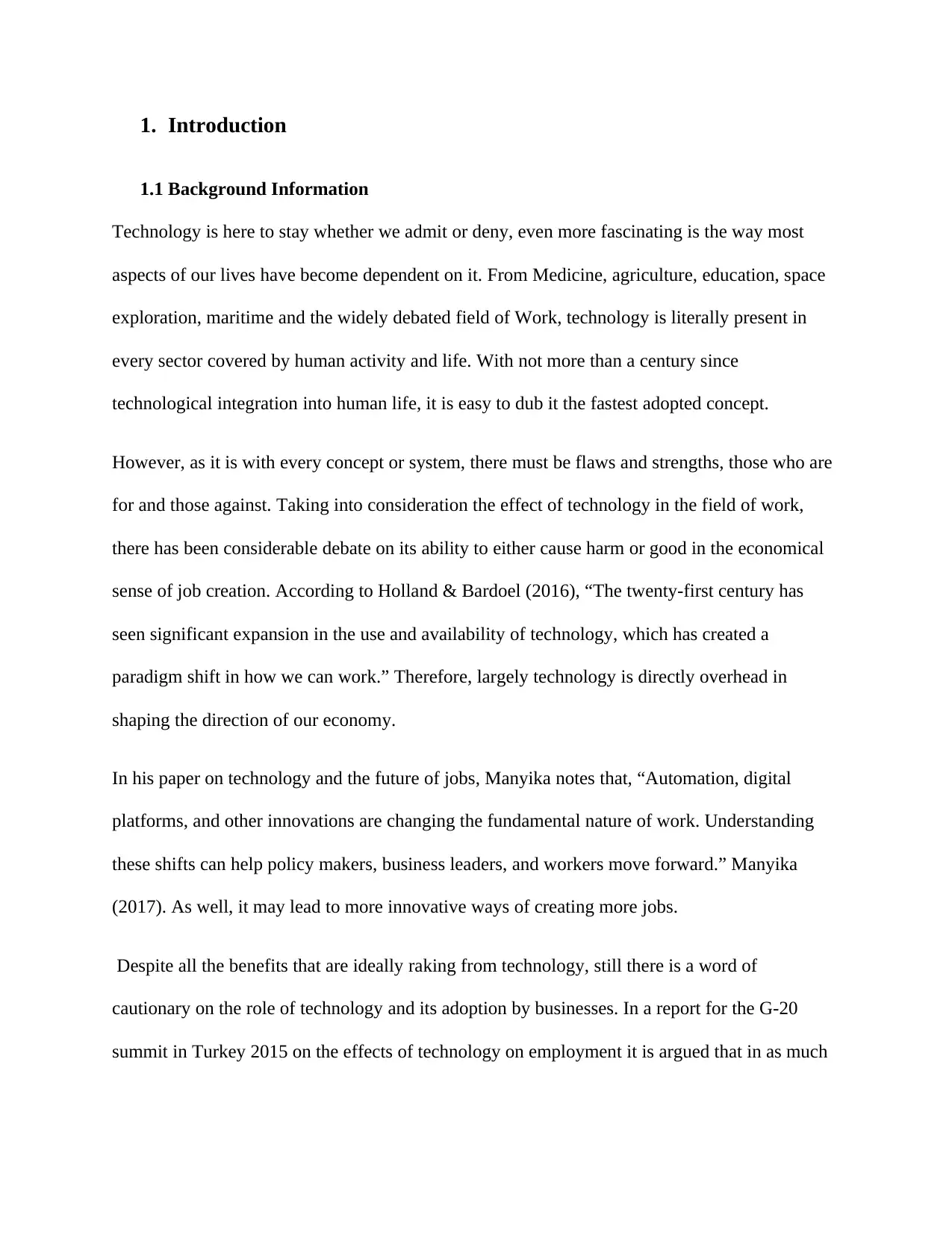
1. Introduction
1.1 Background Information
Technology is here to stay whether we admit or deny, even more fascinating is the way most
aspects of our lives have become dependent on it. From Medicine, agriculture, education, space
exploration, maritime and the widely debated field of Work, technology is literally present in
every sector covered by human activity and life. With not more than a century since
technological integration into human life, it is easy to dub it the fastest adopted concept.
However, as it is with every concept or system, there must be flaws and strengths, those who are
for and those against. Taking into consideration the effect of technology in the field of work,
there has been considerable debate on its ability to either cause harm or good in the economical
sense of job creation. According to Holland & Bardoel (2016), “The twenty-first century has
seen significant expansion in the use and availability of technology, which has created a
paradigm shift in how we can work.” Therefore, largely technology is directly overhead in
shaping the direction of our economy.
In his paper on technology and the future of jobs, Manyika notes that, “Automation, digital
platforms, and other innovations are changing the fundamental nature of work. Understanding
these shifts can help policy makers, business leaders, and workers move forward.” Manyika
(2017). As well, it may lead to more innovative ways of creating more jobs.
Despite all the benefits that are ideally raking from technology, still there is a word of
cautionary on the role of technology and its adoption by businesses. In a report for the G-20
summit in Turkey 2015 on the effects of technology on employment it is argued that in as much
1.1 Background Information
Technology is here to stay whether we admit or deny, even more fascinating is the way most
aspects of our lives have become dependent on it. From Medicine, agriculture, education, space
exploration, maritime and the widely debated field of Work, technology is literally present in
every sector covered by human activity and life. With not more than a century since
technological integration into human life, it is easy to dub it the fastest adopted concept.
However, as it is with every concept or system, there must be flaws and strengths, those who are
for and those against. Taking into consideration the effect of technology in the field of work,
there has been considerable debate on its ability to either cause harm or good in the economical
sense of job creation. According to Holland & Bardoel (2016), “The twenty-first century has
seen significant expansion in the use and availability of technology, which has created a
paradigm shift in how we can work.” Therefore, largely technology is directly overhead in
shaping the direction of our economy.
In his paper on technology and the future of jobs, Manyika notes that, “Automation, digital
platforms, and other innovations are changing the fundamental nature of work. Understanding
these shifts can help policy makers, business leaders, and workers move forward.” Manyika
(2017). As well, it may lead to more innovative ways of creating more jobs.
Despite all the benefits that are ideally raking from technology, still there is a word of
cautionary on the role of technology and its adoption by businesses. In a report for the G-20
summit in Turkey 2015 on the effects of technology on employment it is argued that in as much
Paraphrase This Document
Need a fresh take? Get an instant paraphrase of this document with our AI Paraphraser
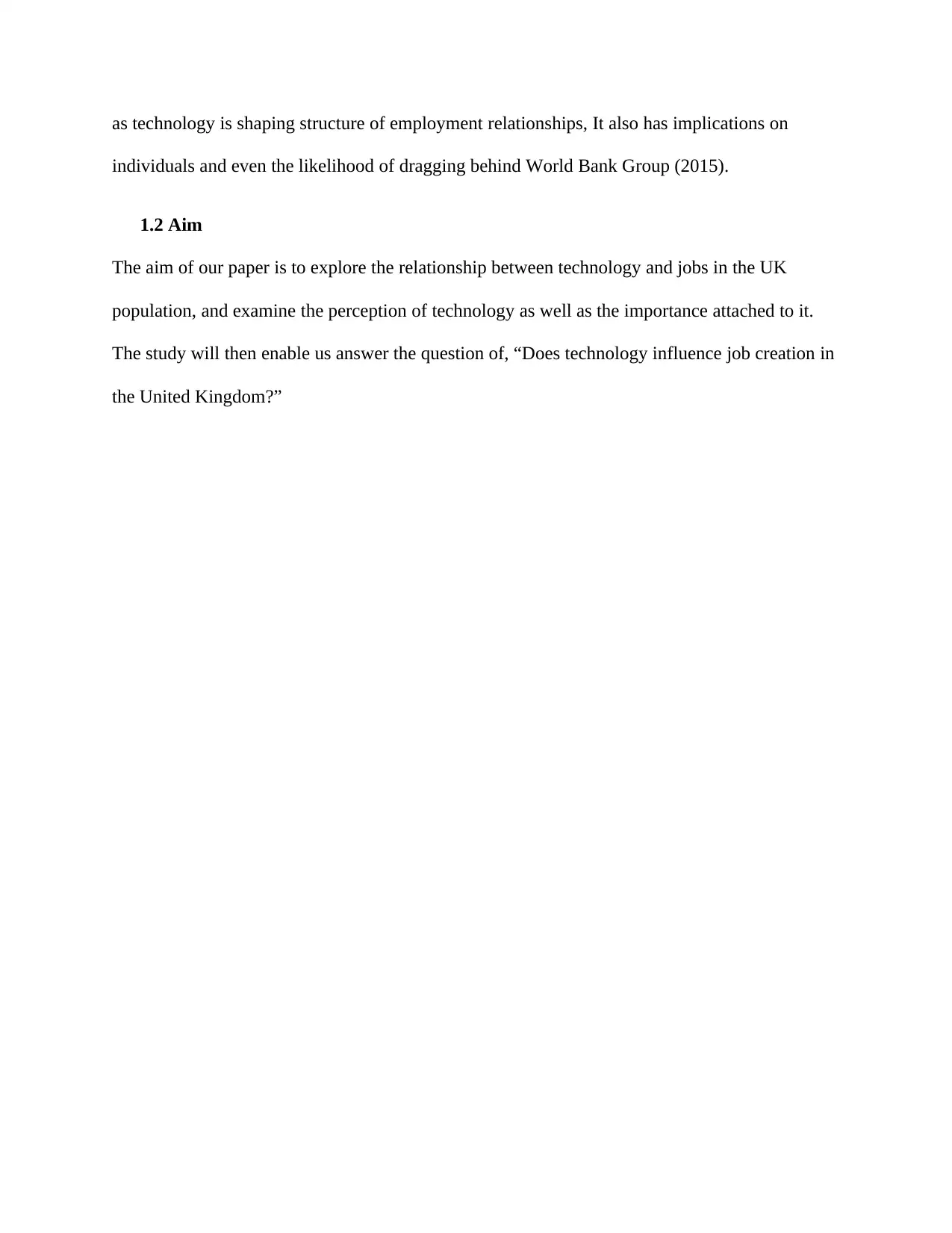
as technology is shaping structure of employment relationships, It also has implications on
individuals and even the likelihood of dragging behind World Bank Group (2015).
1.2 Aim
The aim of our paper is to explore the relationship between technology and jobs in the UK
population, and examine the perception of technology as well as the importance attached to it.
The study will then enable us answer the question of, “Does technology influence job creation in
the United Kingdom?”
individuals and even the likelihood of dragging behind World Bank Group (2015).
1.2 Aim
The aim of our paper is to explore the relationship between technology and jobs in the UK
population, and examine the perception of technology as well as the importance attached to it.
The study will then enable us answer the question of, “Does technology influence job creation in
the United Kingdom?”
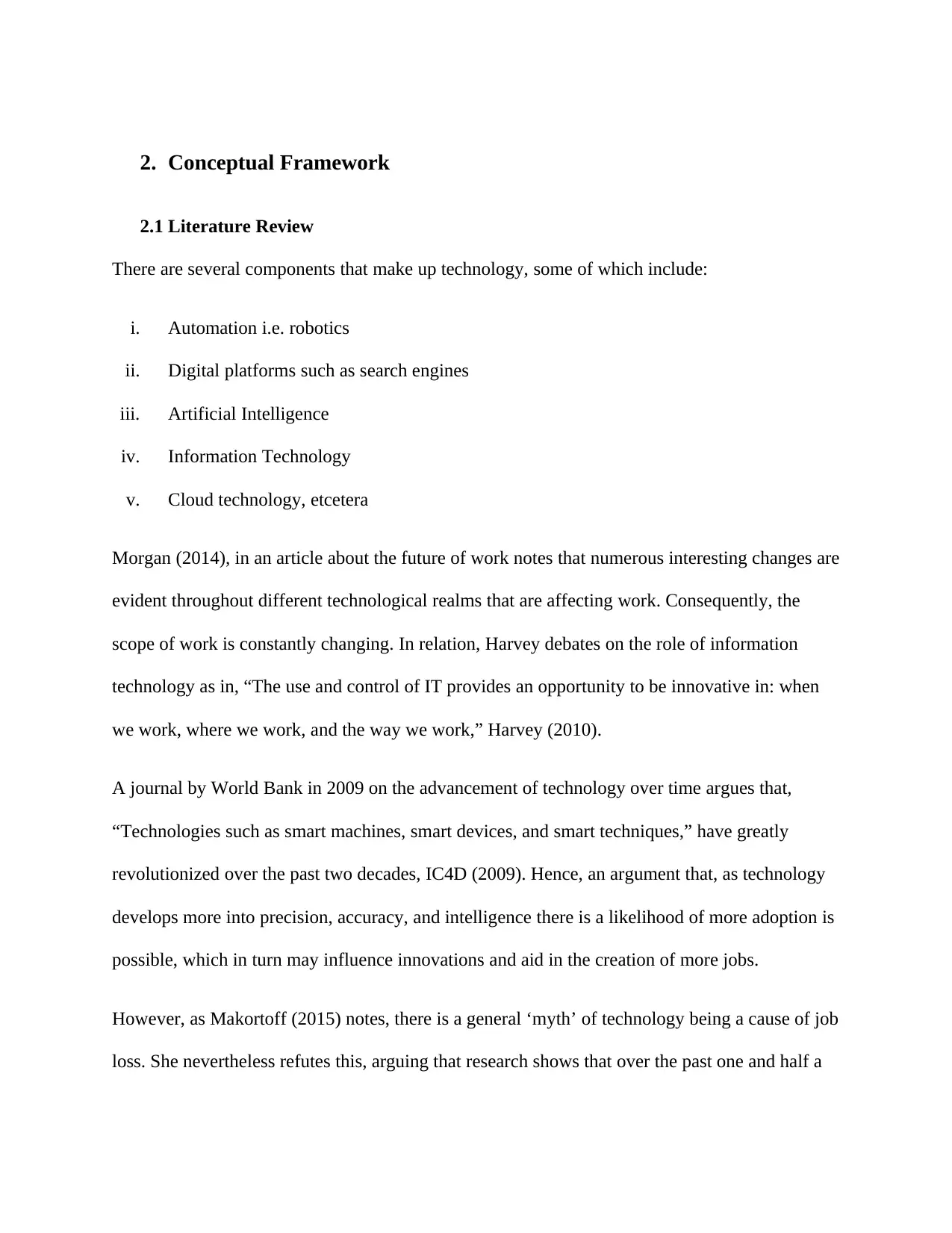
2. Conceptual Framework
2.1 Literature Review
There are several components that make up technology, some of which include:
i. Automation i.e. robotics
ii. Digital platforms such as search engines
iii. Artificial Intelligence
iv. Information Technology
v. Cloud technology, etcetera
Morgan (2014), in an article about the future of work notes that numerous interesting changes are
evident throughout different technological realms that are affecting work. Consequently, the
scope of work is constantly changing. In relation, Harvey debates on the role of information
technology as in, “The use and control of IT provides an opportunity to be innovative in: when
we work, where we work, and the way we work,” Harvey (2010).
A journal by World Bank in 2009 on the advancement of technology over time argues that,
“Technologies such as smart machines, smart devices, and smart techniques,” have greatly
revolutionized over the past two decades, IC4D (2009). Hence, an argument that, as technology
develops more into precision, accuracy, and intelligence there is a likelihood of more adoption is
possible, which in turn may influence innovations and aid in the creation of more jobs.
However, as Makortoff (2015) notes, there is a general ‘myth’ of technology being a cause of job
loss. She nevertheless refutes this, arguing that research shows that over the past one and half a
2.1 Literature Review
There are several components that make up technology, some of which include:
i. Automation i.e. robotics
ii. Digital platforms such as search engines
iii. Artificial Intelligence
iv. Information Technology
v. Cloud technology, etcetera
Morgan (2014), in an article about the future of work notes that numerous interesting changes are
evident throughout different technological realms that are affecting work. Consequently, the
scope of work is constantly changing. In relation, Harvey debates on the role of information
technology as in, “The use and control of IT provides an opportunity to be innovative in: when
we work, where we work, and the way we work,” Harvey (2010).
A journal by World Bank in 2009 on the advancement of technology over time argues that,
“Technologies such as smart machines, smart devices, and smart techniques,” have greatly
revolutionized over the past two decades, IC4D (2009). Hence, an argument that, as technology
develops more into precision, accuracy, and intelligence there is a likelihood of more adoption is
possible, which in turn may influence innovations and aid in the creation of more jobs.
However, as Makortoff (2015) notes, there is a general ‘myth’ of technology being a cause of job
loss. She nevertheless refutes this, arguing that research shows that over the past one and half a
⊘ This is a preview!⊘
Do you want full access?
Subscribe today to unlock all pages.

Trusted by 1+ million students worldwide
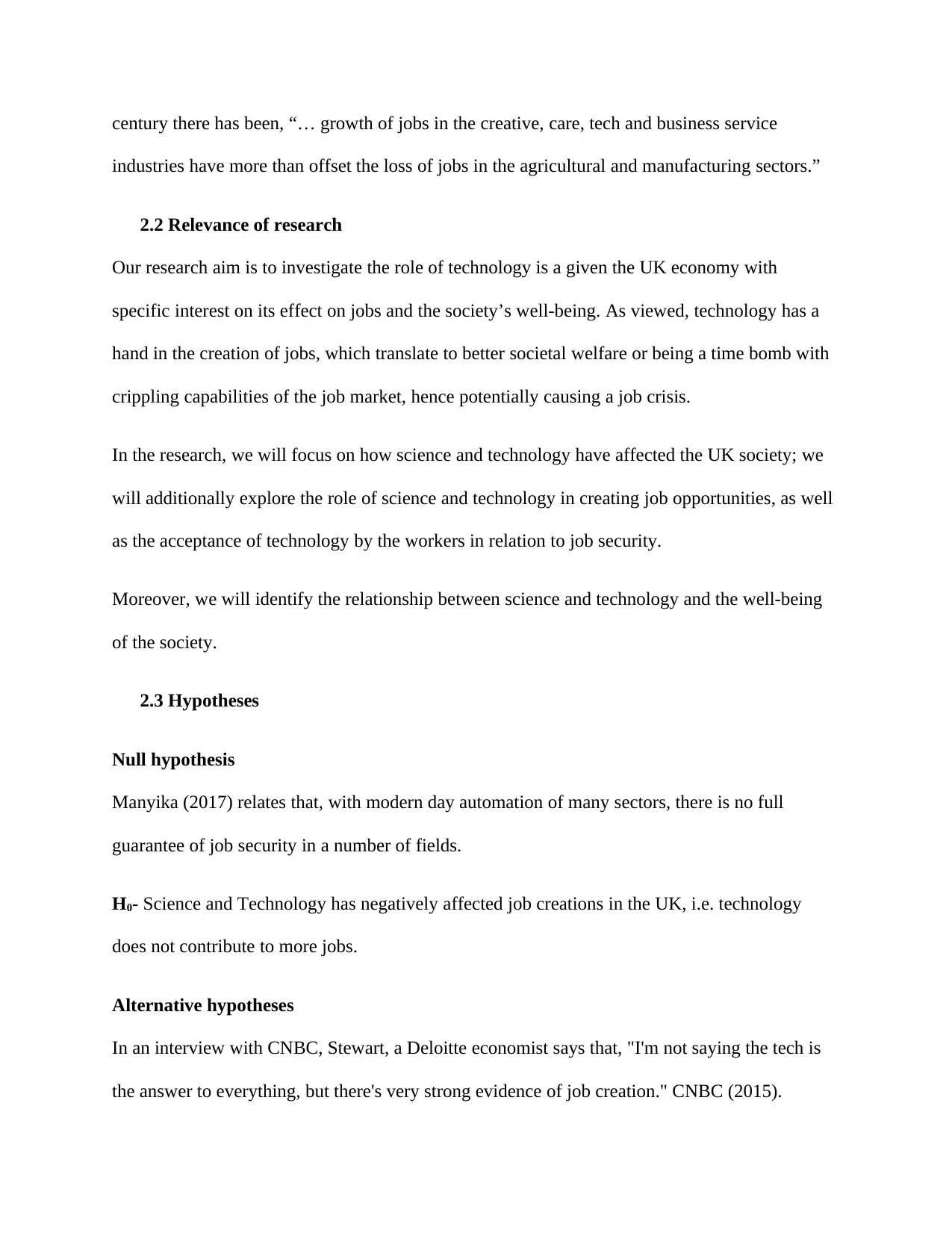
century there has been, “… growth of jobs in the creative, care, tech and business service
industries have more than offset the loss of jobs in the agricultural and manufacturing sectors.”
2.2 Relevance of research
Our research aim is to investigate the role of technology is a given the UK economy with
specific interest on its effect on jobs and the society’s well-being. As viewed, technology has a
hand in the creation of jobs, which translate to better societal welfare or being a time bomb with
crippling capabilities of the job market, hence potentially causing a job crisis.
In the research, we will focus on how science and technology have affected the UK society; we
will additionally explore the role of science and technology in creating job opportunities, as well
as the acceptance of technology by the workers in relation to job security.
Moreover, we will identify the relationship between science and technology and the well-being
of the society.
2.3 Hypotheses
Null hypothesis
Manyika (2017) relates that, with modern day automation of many sectors, there is no full
guarantee of job security in a number of fields.
H0- Science and Technology has negatively affected job creations in the UK, i.e. technology
does not contribute to more jobs.
Alternative hypotheses
In an interview with CNBC, Stewart, a Deloitte economist says that, "I'm not saying the tech is
the answer to everything, but there's very strong evidence of job creation." CNBC (2015).
industries have more than offset the loss of jobs in the agricultural and manufacturing sectors.”
2.2 Relevance of research
Our research aim is to investigate the role of technology is a given the UK economy with
specific interest on its effect on jobs and the society’s well-being. As viewed, technology has a
hand in the creation of jobs, which translate to better societal welfare or being a time bomb with
crippling capabilities of the job market, hence potentially causing a job crisis.
In the research, we will focus on how science and technology have affected the UK society; we
will additionally explore the role of science and technology in creating job opportunities, as well
as the acceptance of technology by the workers in relation to job security.
Moreover, we will identify the relationship between science and technology and the well-being
of the society.
2.3 Hypotheses
Null hypothesis
Manyika (2017) relates that, with modern day automation of many sectors, there is no full
guarantee of job security in a number of fields.
H0- Science and Technology has negatively affected job creations in the UK, i.e. technology
does not contribute to more jobs.
Alternative hypotheses
In an interview with CNBC, Stewart, a Deloitte economist says that, "I'm not saying the tech is
the answer to everything, but there's very strong evidence of job creation." CNBC (2015).
Paraphrase This Document
Need a fresh take? Get an instant paraphrase of this document with our AI Paraphraser
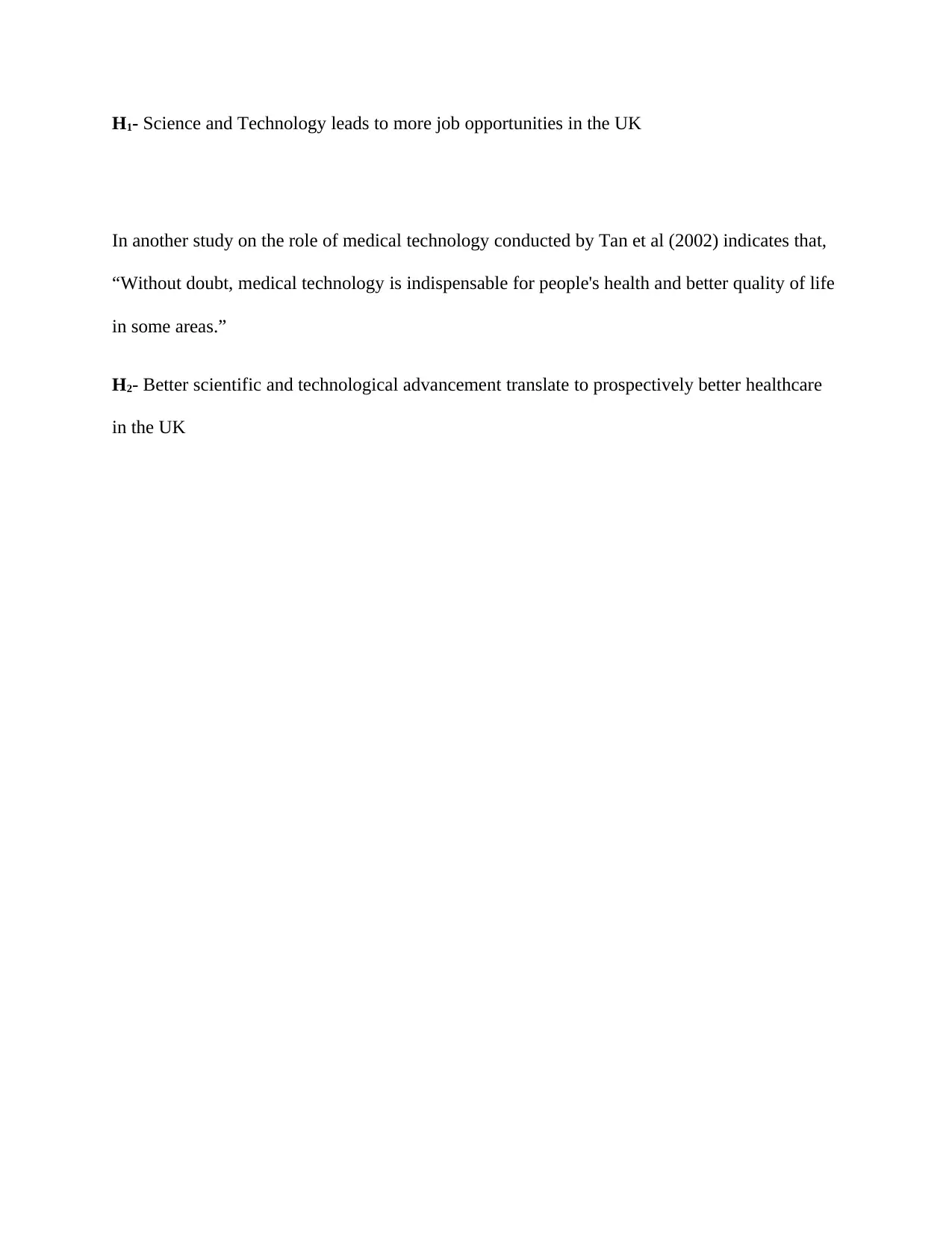
H1- Science and Technology leads to more job opportunities in the UK
In another study on the role of medical technology conducted by Tan et al (2002) indicates that,
“Without doubt, medical technology is indispensable for people's health and better quality of life
in some areas.”
H2- Better scientific and technological advancement translate to prospectively better healthcare
in the UK
In another study on the role of medical technology conducted by Tan et al (2002) indicates that,
“Without doubt, medical technology is indispensable for people's health and better quality of life
in some areas.”
H2- Better scientific and technological advancement translate to prospectively better healthcare
in the UK
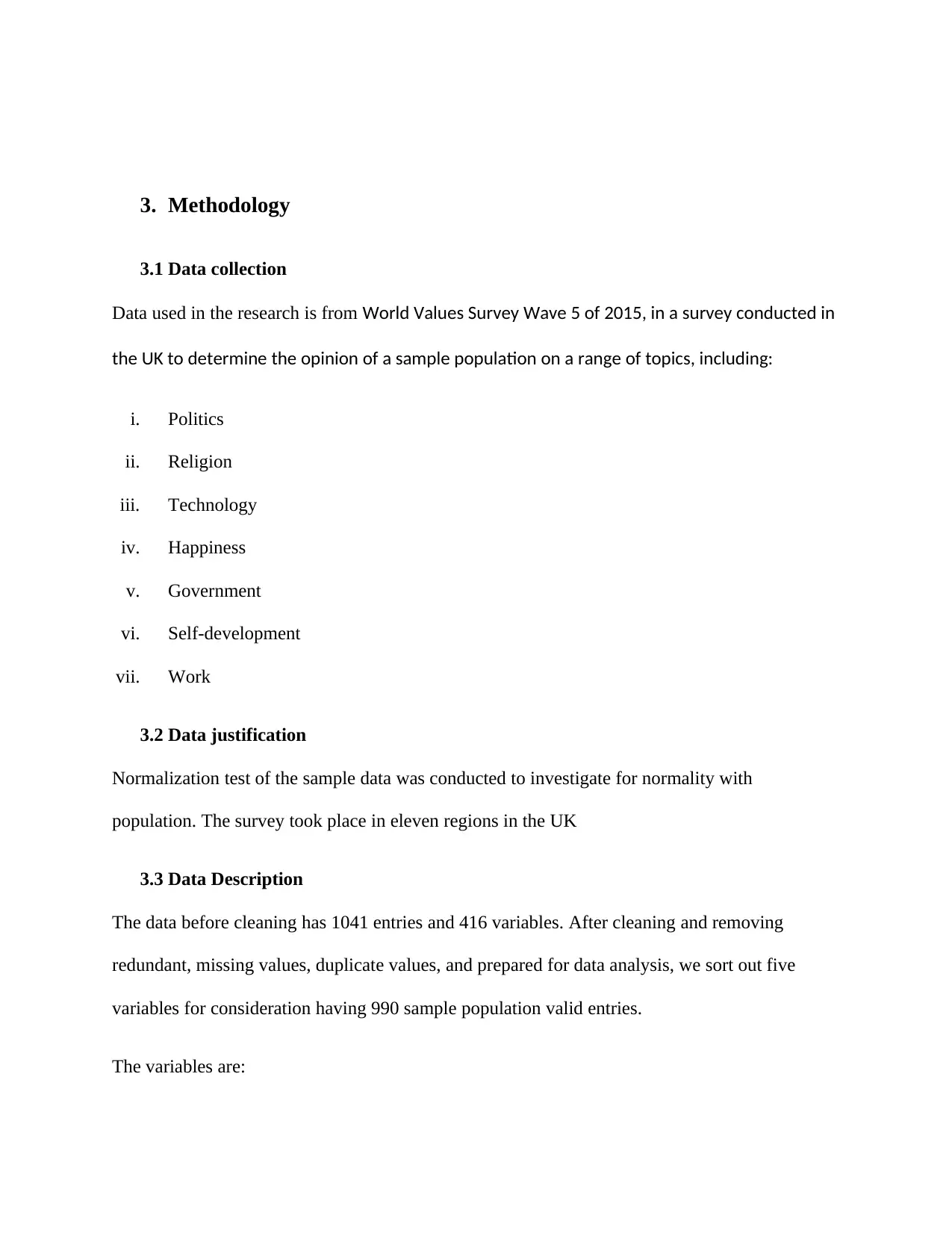
3. Methodology
3.1 Data collection
Data used in the research is from World Values Survey Wave 5 of 2015, in a survey conducted in
the UK to determine the opinion of a sample population on a range of topics, including:
i. Politics
ii. Religion
iii. Technology
iv. Happiness
v. Government
vi. Self-development
vii. Work
3.2 Data justification
Normalization test of the sample data was conducted to investigate for normality with
population. The survey took place in eleven regions in the UK
3.3 Data Description
The data before cleaning has 1041 entries and 416 variables. After cleaning and removing
redundant, missing values, duplicate values, and prepared for data analysis, we sort out five
variables for consideration having 990 sample population valid entries.
The variables are:
3.1 Data collection
Data used in the research is from World Values Survey Wave 5 of 2015, in a survey conducted in
the UK to determine the opinion of a sample population on a range of topics, including:
i. Politics
ii. Religion
iii. Technology
iv. Happiness
v. Government
vi. Self-development
vii. Work
3.2 Data justification
Normalization test of the sample data was conducted to investigate for normality with
population. The survey took place in eleven regions in the UK
3.3 Data Description
The data before cleaning has 1041 entries and 416 variables. After cleaning and removing
redundant, missing values, duplicate values, and prepared for data analysis, we sort out five
variables for consideration having 990 sample population valid entries.
The variables are:
⊘ This is a preview!⊘
Do you want full access?
Subscribe today to unlock all pages.

Trusted by 1+ million students worldwide
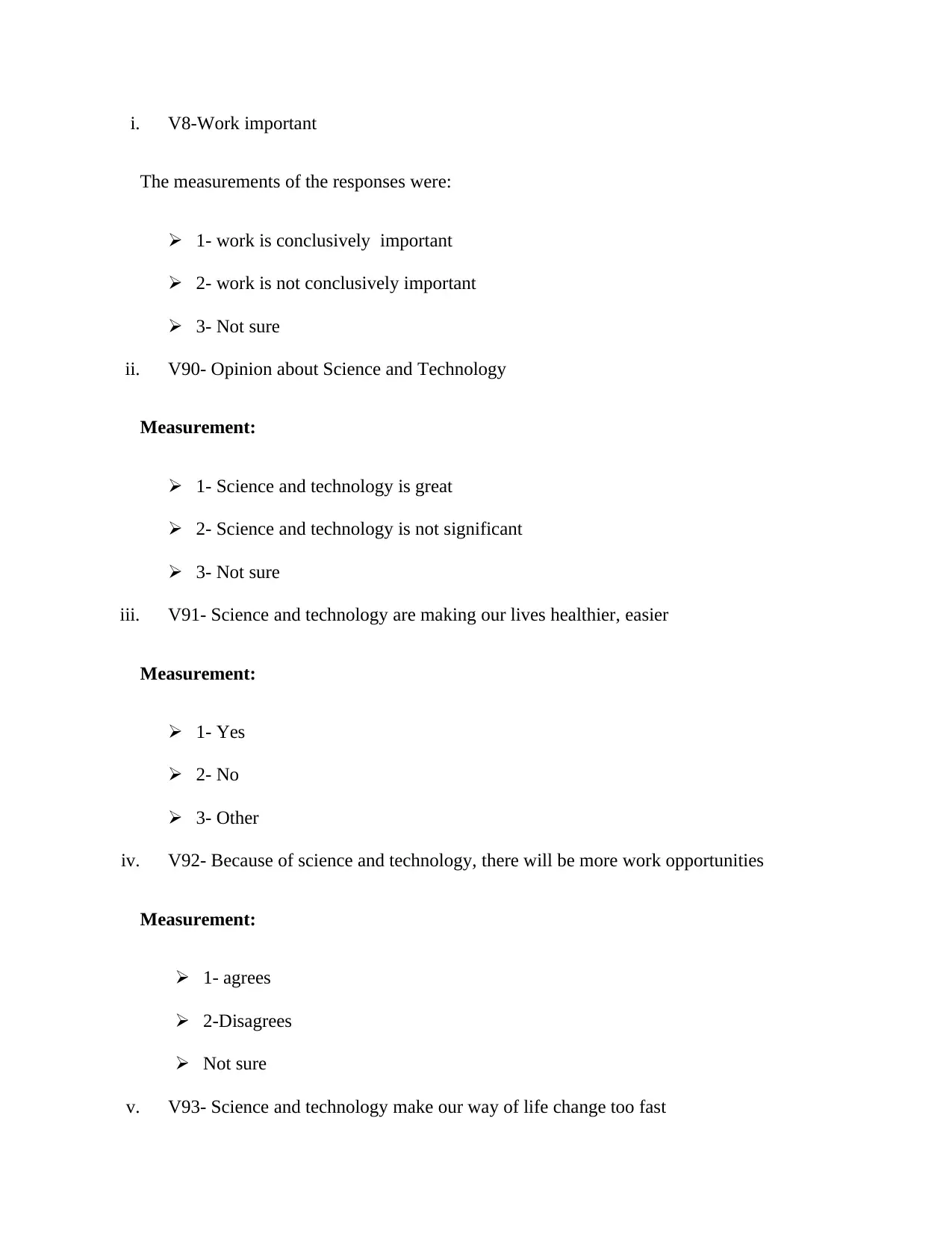
i. V8-Work important
The measurements of the responses were:
1- work is conclusively important
2- work is not conclusively important
3- Not sure
ii. V90- Opinion about Science and Technology
Measurement:
1- Science and technology is great
2- Science and technology is not significant
3- Not sure
iii. V91- Science and technology are making our lives healthier, easier
Measurement:
1- Yes
2- No
3- Other
iv. V92- Because of science and technology, there will be more work opportunities
Measurement:
1- agrees
2-Disagrees
Not sure
v. V93- Science and technology make our way of life change too fast
The measurements of the responses were:
1- work is conclusively important
2- work is not conclusively important
3- Not sure
ii. V90- Opinion about Science and Technology
Measurement:
1- Science and technology is great
2- Science and technology is not significant
3- Not sure
iii. V91- Science and technology are making our lives healthier, easier
Measurement:
1- Yes
2- No
3- Other
iv. V92- Because of science and technology, there will be more work opportunities
Measurement:
1- agrees
2-Disagrees
Not sure
v. V93- Science and technology make our way of life change too fast
Paraphrase This Document
Need a fresh take? Get an instant paraphrase of this document with our AI Paraphraser
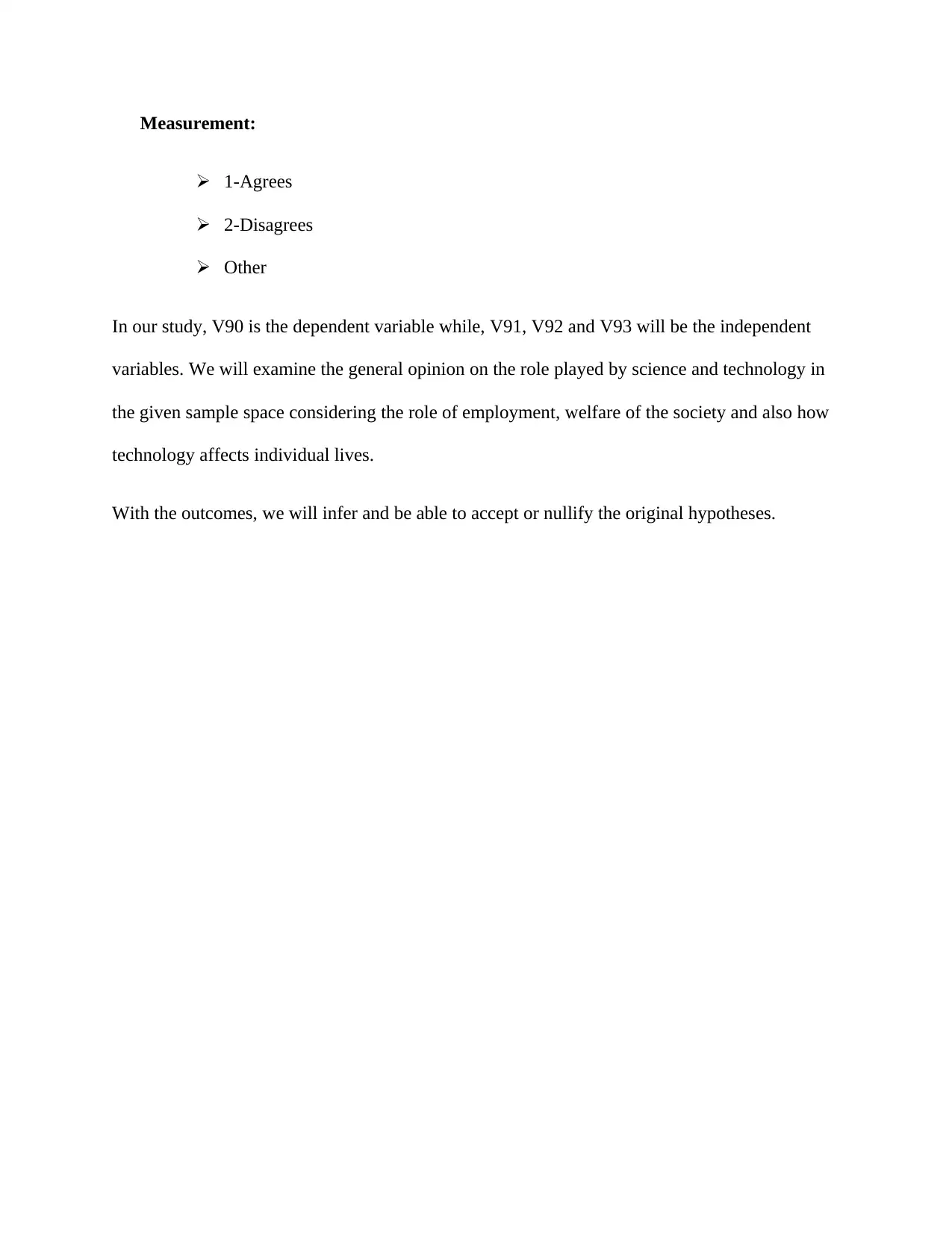
Measurement:
1-Agrees
2-Disagrees
Other
In our study, V90 is the dependent variable while, V91, V92 and V93 will be the independent
variables. We will examine the general opinion on the role played by science and technology in
the given sample space considering the role of employment, welfare of the society and also how
technology affects individual lives.
With the outcomes, we will infer and be able to accept or nullify the original hypotheses.
1-Agrees
2-Disagrees
Other
In our study, V90 is the dependent variable while, V91, V92 and V93 will be the independent
variables. We will examine the general opinion on the role played by science and technology in
the given sample space considering the role of employment, welfare of the society and also how
technology affects individual lives.
With the outcomes, we will infer and be able to accept or nullify the original hypotheses.
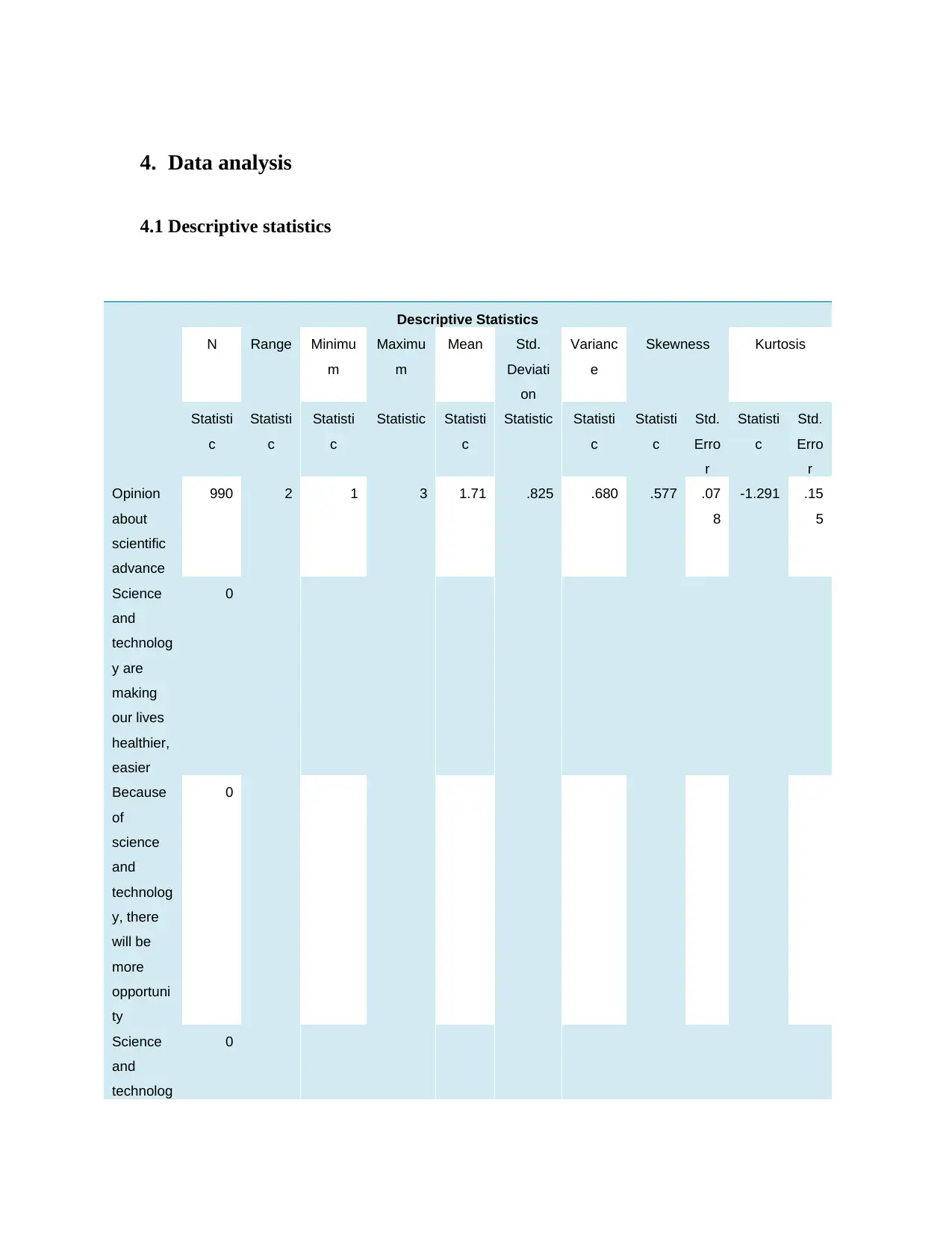
4. Data analysis
4.1 Descriptive statistics
Descriptive Statistics
N Range Minimu
m
Maximu
m
Mean Std.
Deviati
on
Varianc
e
Skewness Kurtosis
Statisti
c
Statisti
c
Statisti
c
Statistic Statisti
c
Statistic Statisti
c
Statisti
c
Std.
Erro
r
Statisti
c
Std.
Erro
r
Opinion
about
scientific
advance
990 2 1 3 1.71 .825 .680 .577 .07
8
-1.291 .15
5
Science
and
technolog
y are
making
our lives
healthier,
easier
0
Because
of
science
and
technolog
y, there
will be
more
opportuni
ty
0
Science
and
technolog
0
4.1 Descriptive statistics
Descriptive Statistics
N Range Minimu
m
Maximu
m
Mean Std.
Deviati
on
Varianc
e
Skewness Kurtosis
Statisti
c
Statisti
c
Statisti
c
Statistic Statisti
c
Statistic Statisti
c
Statisti
c
Std.
Erro
r
Statisti
c
Std.
Erro
r
Opinion
about
scientific
advance
990 2 1 3 1.71 .825 .680 .577 .07
8
-1.291 .15
5
Science
and
technolog
y are
making
our lives
healthier,
easier
0
Because
of
science
and
technolog
y, there
will be
more
opportuni
ty
0
Science
and
technolog
0
⊘ This is a preview!⊘
Do you want full access?
Subscribe today to unlock all pages.

Trusted by 1+ million students worldwide
1 out of 35